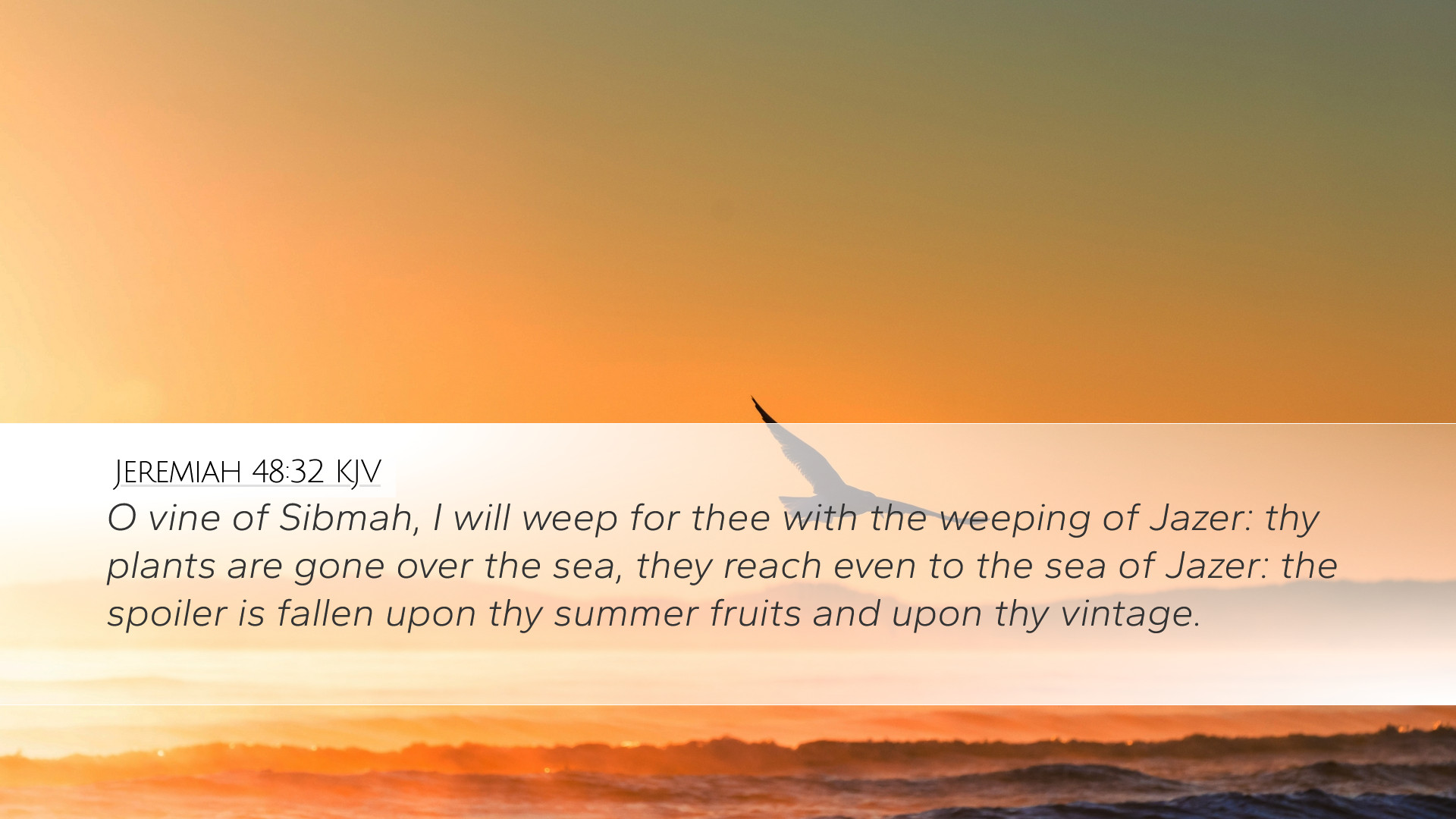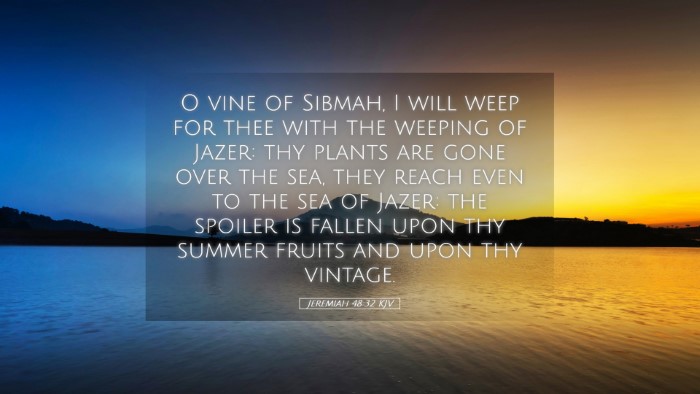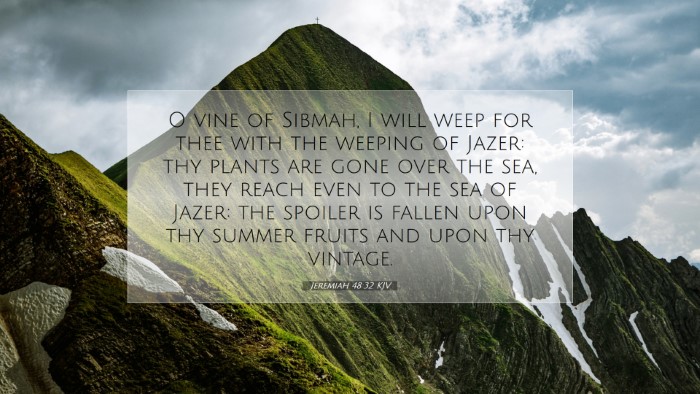Commentary on Jeremiah 48:32
Verse Context: Jeremiah 48:32 states, "O vine of Sibmah, I will weep for thee with the weeping of Jazer: thy plants are gone over the sea, they reach even to the sea of Jazer: the spoiler is fallen upon thy summer fruits and upon thy vintage." This verse is part of God's lament over Moab, expressing deep sorrow for the destruction that has come upon it.
Introduction
The Book of Jeremiah is saturated with prophecies of judgment, particularly against nations that have turned against God or have exhibited pride and idolatry. In chapter 48, God pronounces destruction over Moab, an ancient nation that had a long history of opposition to Israel. The image of the vine in this verse serves as a poignant metaphor for Moab's prosperity and subsequent downfall.
Analysis of the Verse
Jeremiah’s imagery of the vine and the weeping over Sibmah illustrates the devastation of Moab's resources and the emotional impact of its downfall.
- The Vine of Sibmah: Sibmah is noted for its vineyards. Matthew Henry emphasizes that the vine represents the flourishing state of Moab, which will be mourned as it faces inevitable destruction.
- Weeping for Jazer: Jazer, a city known for its beauty and fruits, symbolizes the loss of joy and festivities that prosperity once brought. This alludes to how the invader's approach brings sorrow and desolation.
- The Spoiler: The reference to the spoiler signifies the enemy, which serves as a divine instrument for judgment. Albert Barnes notes that the descriptions highlight the swiftness of this destruction upon Moab's summer fruits and vintage, signifying a total loss of harvest and sustenance.
Commentary Insights
Matthew Henry's Commentary: In his analysis, Henry provides a detailed exposition of the emotional and spiritual ramifications of this passage. He underscores that the lament for Moab not only reflects God's justice but also His compassion for those He judges. The metaphor of the vine speaks to the beauty of Moab's past prosperity, now replaced with barrenness due to sin and idolatry.
Albert Barnes' Notes: Barnes explicates that the destruction mentioned in this verse serves as a metaphor for the broader divine judgment upon nations that fail to adhere to God's will. He points out that the spoilage signifies both the physical loss of agricultural wealth and the spiritual desolation that follows national sin.
Adam Clarke's Commentary: Clarke brings in a nuanced historical context, elucidating Moab's idolatrous practices and the divine response to such actions. He describes the sorrow over the vine as indicative of God’s grief over the spiritual plight of a nation that once flourished but failed to honor Him. Clarke emphasizes the prophetic nature of Jeremiah's lament as an example for us today, warning against the dangers of spiritual complacency.
Theological Reflections
This verse invites deeper theological reflection on God’s nature as both a judge and a compassionate being. It also raises questions about how prosperity can lead to complacency and subsequent judgment. The imagery invites believers today to consider the fruits of their own lives and the nations they inhabit.
- Divine Judgment: The inevitability of judgment upon nations echoes throughout Scripture, reminding readers that nations and individuals alike reap what they sow (Galatians 6:7).
- God’s Grief: The lamentation over Moab illustrates that divine judgment does not come without sorrow; God desires repentance and redemption.
- Call to Awareness: The call to reflect on spiritual well-being is timeless. Just as Moab neglected its relationship with God, so too can modern believers find themselves in peril if they forsake their foundations in faith.
Practical Applications
Pastors, students, and scholars can draw practical applications from Jeremiah 48:32:
- Emotional Awareness: Understanding God's emotional response helps in forming a relationship based on recognition of His feelings towards sin and repentance.
- The Importance of Harvest: Believers are reminded of the importance of spiritual fruits in their lives and communities, which requires intentional cultivation of faith.
- Warnings Against Idolatry: The narrative serves as a caution against modern forms of idolatry, prompting Christians to evaluate what constitutes their “vine” and whether it is flourishing or wilting.
Conclusion
Jeremiah 48:32 poignantly captures the dual themes of judgment and lamentation in God's discourse through the prophet Jeremiah. The imagery serves as a profound reminder of the sorrow involved in the destruction of a nation that has deviated from its calling and purpose. For today’s church, it serves as a crucial exhortation towards faithfulness and the continual pursuit of a relationship with God that produces lasting spiritual fruits.


